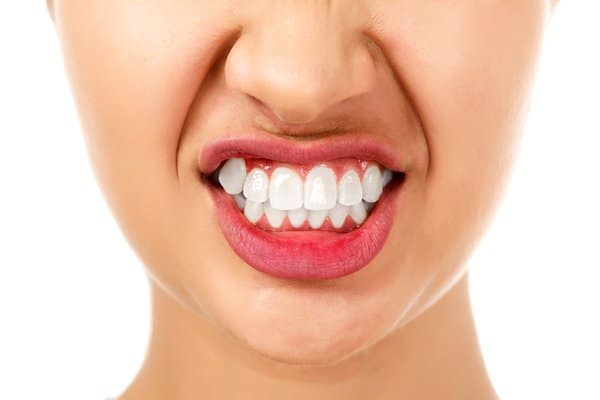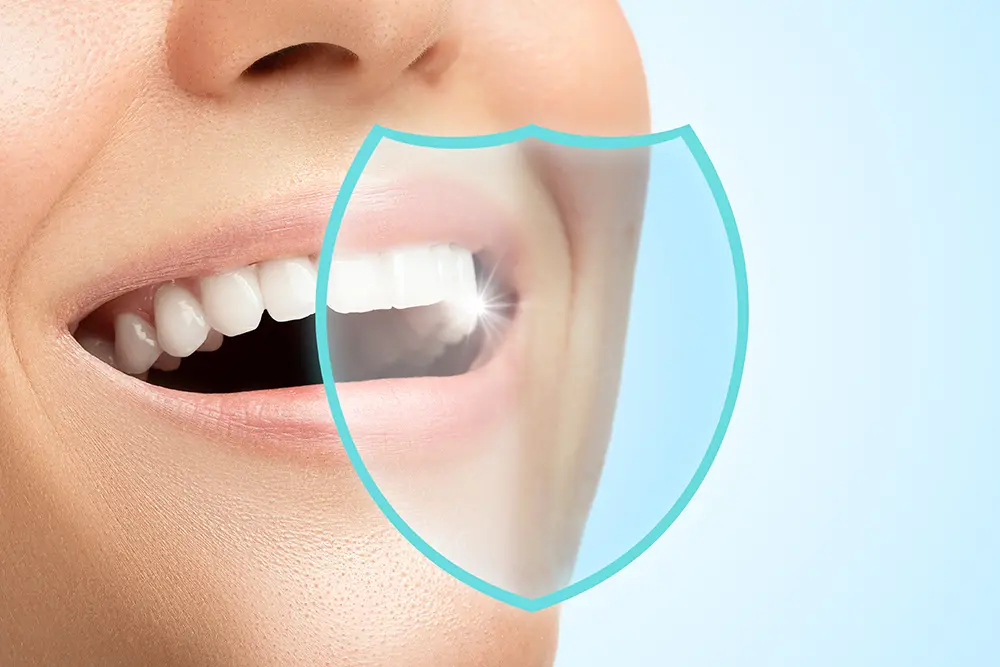Normally, the first answer I have to this question is that someone just annoyed me. However, for most of the general population, grinding of teeth is usually secondary to stress or anxiety.
Teeth grinding, or bruxing, can be conscious or subconscious. A small group of the affected individuals who grind their teeth consciously actually find it quite enjoyable, or do it as part of their daily activities.
The larger population who grind their teeth, however, do it subconsciously, or in their sleep. People who grind their teeth may not do it all the time and are generally more likely to do so during periods of increased stress related to family, work, health or important events.
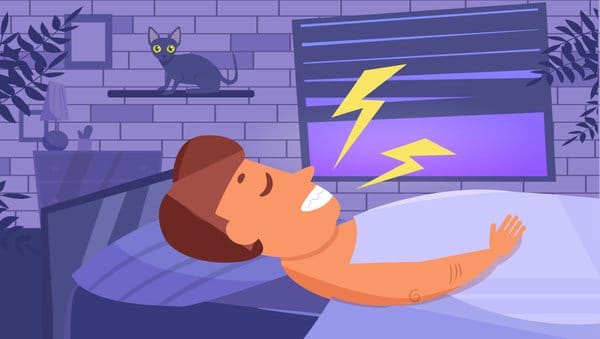
Facial morphology can also play an important role in predicting the propensity for someone to grind their teeth. In general, patients with a shorter lower face height and square jaw are more likely to grind their teeth.
How Do I Know I Grind My Teeth?
- Pain: Tell-tale symptoms of nocturnal teeth grinding include waking up with a dull headache, earache, or a sore jaw or face muscles.
- Sound: Frequently, loved ones will be the first ones to inform you that you are grinding your teeth at night, as the sound of teeth grinding together can be quite audible.
- Dental Check: Certain salient signs of teeth grinding can also be seen by the dentist, and this includes worn biting surface of teeth, wedge-like cavities that form on the side of your teeth near the gum (abfraction), crack lines on teeth that become more visible over time, chipped teeth and fillings, clicking and/or soreness of jaw joints when opening and closing your mouth, and also facial muscles that are tender to palpation during the comprehensive dental examination.
Patients with a highly erosive diet, combined with teeth bruxing, can accelerate the loss of tooth structure and result in very worn-down teeth that look extremely short; in severe cases, these teeth may need root canals and crowns, or even need to be taken out.
How do I stop grinding my teeth?
1. Avoid Triggers For Teeth Grinding
Your teeth grinding may be triggered by external circumstances. You can pinpoint the triggers or events that correlate with times of intensive teeth grinding. Dealing with these triggers or events can significantly help reduce the incidence and/or intensity of teeth grinding.

Here are some ways to avoid potential triggers:
- Reduce intake of stimulants, like caffeine (e.g. chocolate, coffee, cola)
- Learn to relax (easier said than done sometimes)
- Take a holiday, where possible
- Try stress counselling
2. Keep Your Muscles Relaxed
- Consciously avoid teeth grinding when you’re awake. Avoid chewing on nails, gum, pencils, or pens. Also, pay attention to stop yourself from clenching or grinding your teeth. Or, get a friend to tap you on the shoulder if they notice you clenching or grinding your teeth.
- Prep Before Bed. You can place a heat pack over either side of your face for 10 minutes every night before bed. This helps relax tense facial muscles and reduces the intensity and/or incidence of teeth grinding.
3. Visit a physiotherapist
We often neglect that the body is one intricate system. When one part of the body is out of whack, some other part can also be affected. A verbal survey of my patients have revealed that patients with tense facial muscles often also have tense neck and shoulder muscles.

A massage from a qualified physiotherapist for your neck, shoulder and facial muscles can help relieve the tension in these muscles. This can potentially reduce the intensity and/or frequency of teeth grinding (hey, if it doesn’t work, at least you got a nice massage!).
4. Fabricate a customised night (occlusal) splint with the dentist
A customised night splint is a device you can wear over your teeth to protect remaining teeth from further damage due to grinding. It can also help deprogram your facial muscles and reduce the subconscious compulsion to grind your teeth.
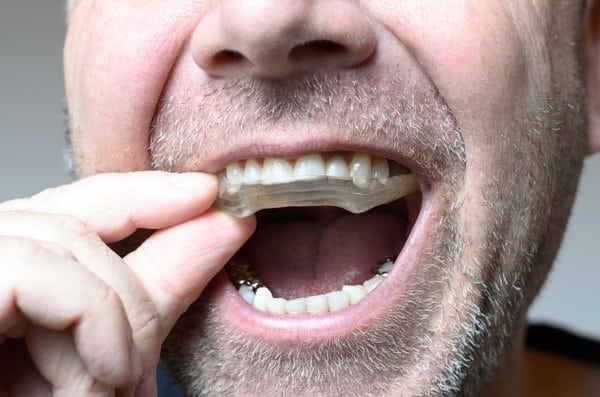
If you get one made, it requires compliance to wear it nightly (let’s face it, it is not exactly sexy-looking). It can also take some time to get used to it (it can be a mouthful).
How To Relieve Pain From Teeth Grinding
Your muscles or jaw joint can get sore from teeth grinding. To relieve acute discomfort, you can place a cold pack over the facial muscles or the jaw joint. It works similar to using a cold pack for sore knee joints or muscles.
There are also medications that provide symptomatic pain relief. You can judiciously use non-steroidal anti-inflammatory drugs (NSAIDs) like Ibuprofen and Naproxen, and other medications prescribed by your medical professional. These also reduce acute inflammation (and hence soreness) of the affected facial muscles and jaw joints.
What if you have tried everything as mentioned above and nothing has helped?
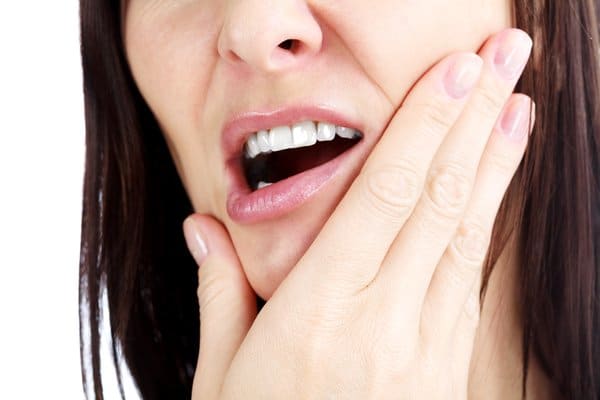
When you find that you have tried all the various tips and tricks that your dentist has told you about, but you are still grinding your teeth, and also experience a debilitating amount of discomfort, and it is significantly affecting your quality of life, then you may need to see a pain management specialist.
In some cases, the teeth grinding may be secondary to undiagnosed sleep disorders. You may want to speak to your physician or a sleep physician about this.
In Summary
Unconscious teeth grinding can be caused by triggers such as stimulants or stressful events. You can tell you grind your teeth if you have pain around your jaw area, or when dentists spot tell-tale signs such as worn or chipped teeth.
To avoid teeth grinding, you can try:
- Avoiding triggers such as taking stimulants like coffee
- Try to relax and manage your stress
- Use a heat pack at night to relax your jaw muscles
- Consciously stop yourself from clenching or grinding in the day
- See a physiotherapist for a massage to relax your neck and shoulder muscles
- Get a customised night (occlusal) splint with the dentist
In the meantime, you can use using a cold pack or medications to manage pain caused by teeth grinding. If you’re not sure if you grind your teeth, or would like to get treatment, you can visit our friendly dentists for an appointment today.

